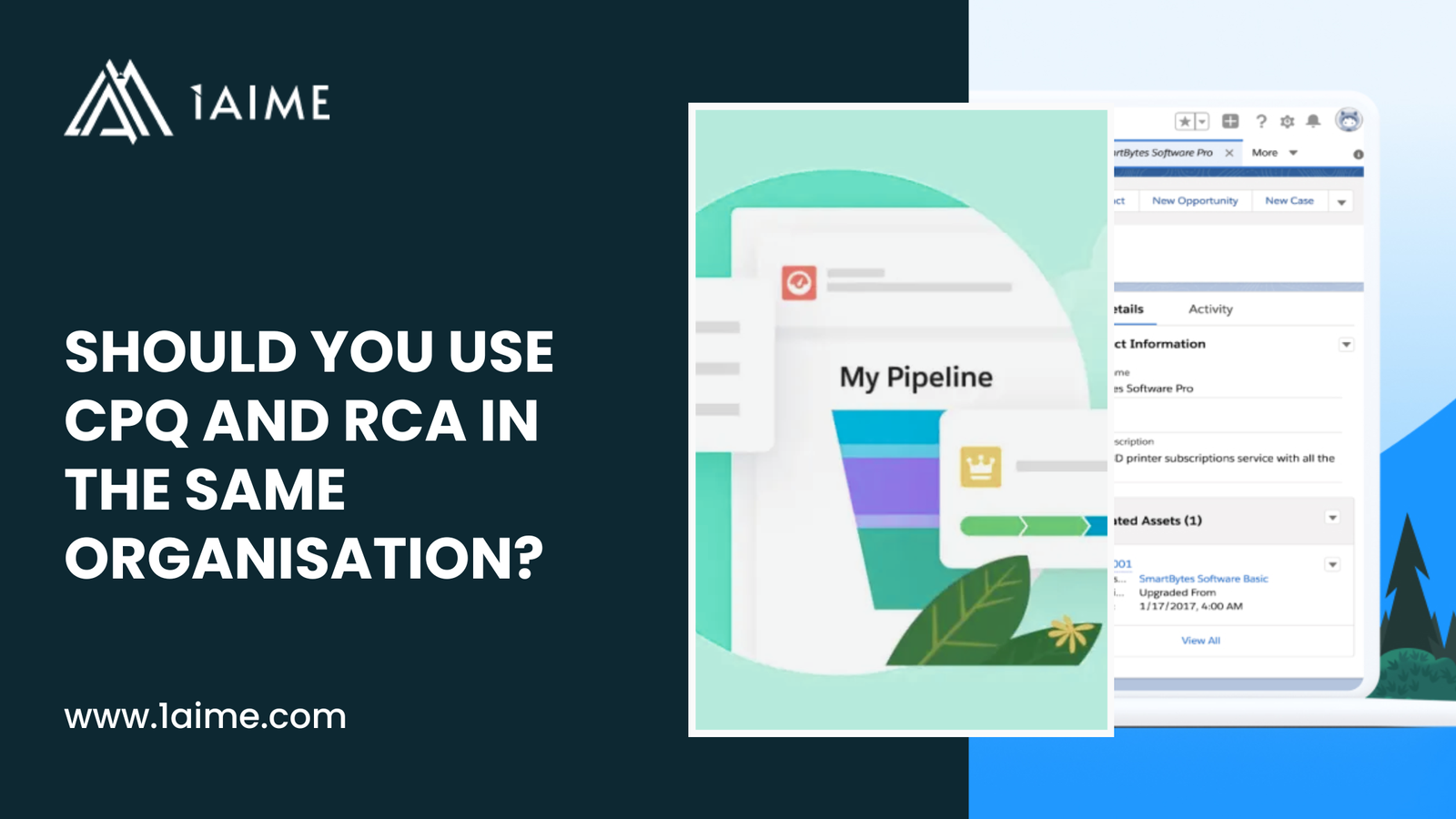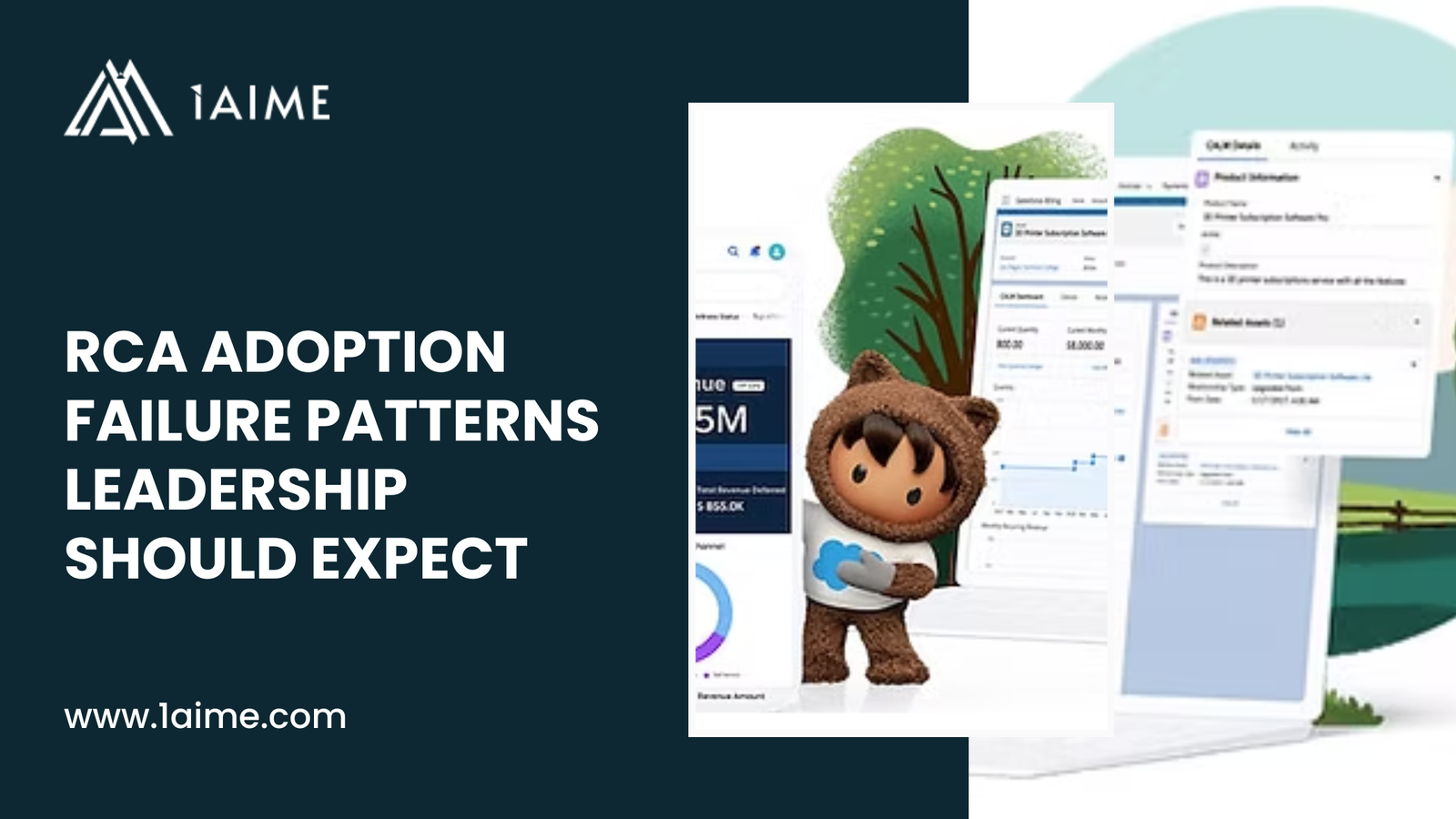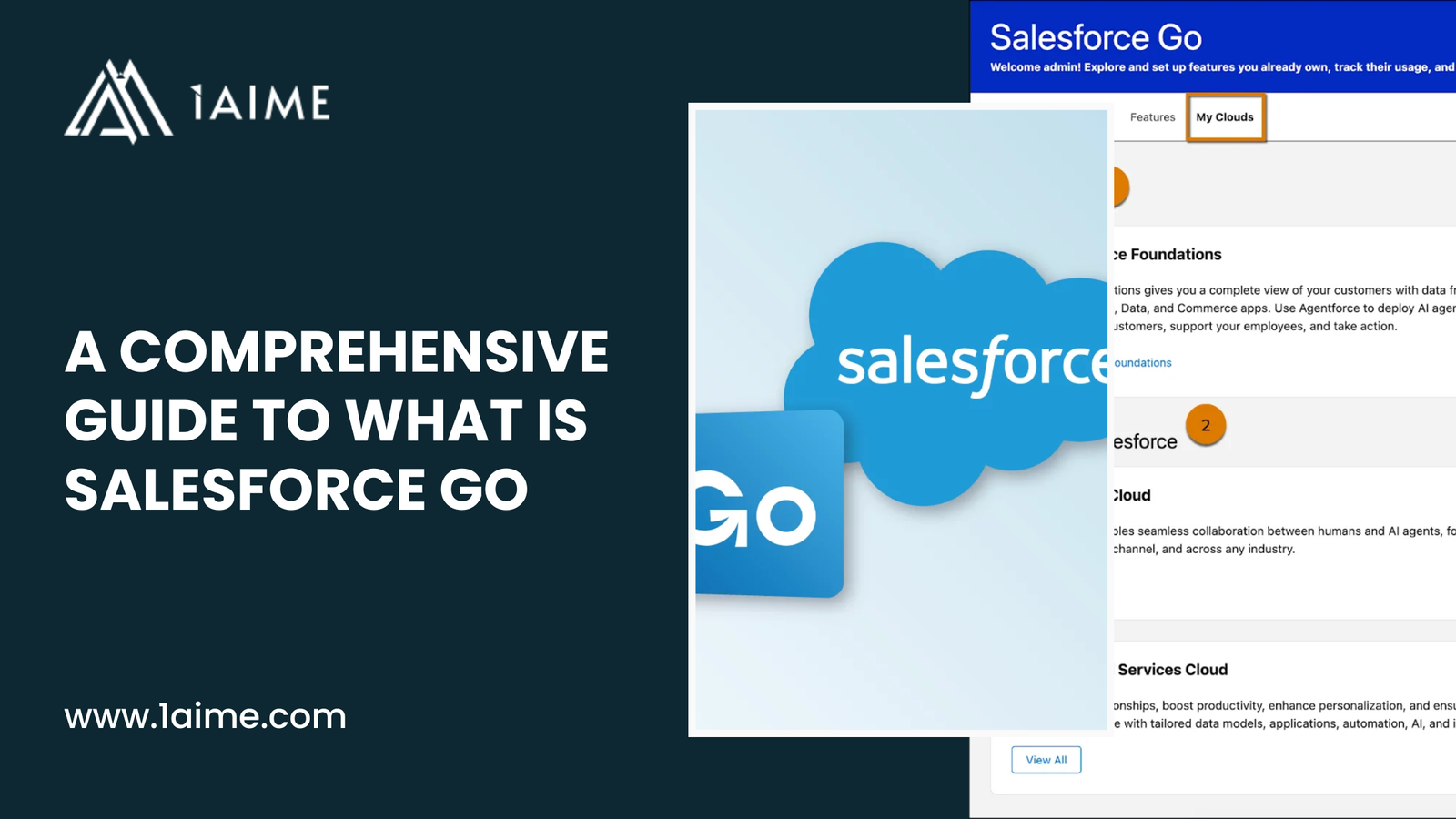Revenue operations define how efficiently a business converts demand into measurable growth. Salesforce CPQ long stood as the standard for quoting and pricing, yet the market has shifted. Salesforce now advances Revenue Cloud Solution as the new direction.
So, you also must face a critical question: does CPQ remain sufficient, or is it time to adopt the broader capabilities of Revenue Cloud?
1AIME’s guide to Salesforce Revenue Cloud VS CPQ breaks down the functional differences and strategic implications. So, you can find the right answer with ease.
Key Takeaways
- Salesforce CPQ remains focused on quoting, pricing, and configuration in a contained scope.
- Revenue Cloud expands into full revenue lifecycle management across quoting, billing, and renewals.
- Salesforce now positions Revenue Cloud as the strategic successor to CPQ.
- AI upgrades embed forecasting, anomaly detection, and personalised pricing into revenue operations.
- Enterprise adoption leans toward Revenue Cloud, while CPQ retains relevance for mid-market use cases.
- Migration from CPQ to Revenue Cloud requires an advisory-led roadmap to prevent disruption.
- The right choice depends on revenue complexity, integration demands, and growth priorities.
First, Let’s Grasp the Basics of Salesforce Revenue Cloud and CPQ
Salesforce CPQ (Configure, Price, Quote) is a specialised tool that automates the process of creating accurate sales quotes. It helps sales teams configure complex products, apply pricing rules, and generate contracts quickly. CPQ is focused on efficiency within the quoting cycle, just to ensure accuracy, compliance, and faster deal closure.
Salesforce Revenue Cloud extends beyond CPQ. It is an umbrella solution that connects CPQ with Billing, Partner Relationship Management, Subscription Management, and Revenue Lifecycle capabilities. Revenue Cloud is designed to give leadership full visibility across the lead-to-revenue process, from product configuration to cash collection. All while enabling flexible pricing models like subscriptions, usage-based billing, and renewals.
In simple terms:
- CPQ = precision in quoting.
- Revenue Cloud = full cycle revenue management.
The distinction between CPQ and Revenue Cloud is important for C-Suite leaders. After all, CPQ is tactical and Revenue Cloud is strategic. CPQ ensures your quotes are right. Revenue Cloud ensures your entire revenue lifecycle is scalable, transparent, and future-proof.
Is Salesforce Revenue Cloud the New Name for CPQ?
Revenue Cloud is not a rebrand of Salesforce CPQ, but rather a broader solution that expands on CPQ’s foundations. Salesforce CPQ (Configure, Price, Quote) remains a standalone product within the Salesforce ecosystem, while Revenue Cloud introduces a comprehensive revenue lifecycle management (RLM) approach.
What CPQ Represents?
Salesforce CPQ focuses on:
- Product configuration to ensure accurate bundles
- Pricing and discount logic
- Quote generation with approval workflows
- Integration with billing for smooth order execution
It remains a mature, well-documented product trusted for years by organisations that need to streamline sales quoting.
What Revenue Cloud Adds?
Revenue Cloud goes beyond CPQ by managing the entire revenue lifecycle:
- Contract Management – end-to-end oversight from initial agreement through renewals
- Billing and Invoicing – automation of recurring revenue, usage-based pricing, and multi-model billing
- Revenue Recognition – compliance with ASC 606 / IFRS 15, aligning finance with sales
- Subscription and Usage Models – support for modern consumption-based pricing strategies
- API-First Architecture – built natively on Salesforce’s core platform, unlike CPQ which is a managed package, making Revenue Cloud more extensible and AI-ready
What Changed in the Transition from CPQ to Revenue Cloud?
- Scope – CPQ focuses on quoting; Revenue Cloud unifies quoting, billing, and revenue recognition under one umbrella.
- Architecture – Revenue Cloud is headless and API-first, enabling flexibility in integrations, whereas CPQ operates as a managed package.
- Future Roadmap – Salesforce invests in Revenue Cloud as the future of revenue management, while CPQ remains supported but not the centrepiece of innovation.
So, it is clear that Revenue Cloud is not simply CPQ under a new name. Instead, it represents Salesforce’s evolution from quoting software into a full-scale revenue management platform, integrating sales, finance, and operations in a single ecosystem.
Salesforce Revenue Cloud vs CPQ: Key Differences
Salesforce CPQ and Revenue Cloud share the same foundation but address different layers of the revenue process. CPQ improves the way sales teams configure deals, while Revenue Cloud extends control over billing, compliance, and lifecycle management.
1. Audience and Ownership
Salesforce CPQ supports sales teams in daily execution. For example, a sales rep in a manufacturing firm can use CPQ to configure machinery packages, apply discounts, and generate a customer-ready quote in minutes. Revenue Cloud supports leadership functions such as finance and RevOps.
For instance, a SaaS CFO uses Revenue Cloud to track recurring subscriptions, deferred revenue, and compliance across global markets.
2. Process Scope
CPQ focuses on the sales desk. A telecom provider may use CPQ to assemble a mobile plan, add device financing, and produce a proposal instantly. Revenue Cloud manages the lifecycle that follows. The same telecom provider can automate monthly billing, process mid-cycle plan upgrades, and handle regulatory tax compliance through Revenue Cloud without leaving Salesforce.
3. Data Model and Revenue Visibility
CPQ delivers deal-level insight. A professional services firm sees how discounts applied in a single proposal impact the contract value. Revenue Cloud delivers enterprise-level visibility. The same firm’s CFO gains a unified view of billed hours, renewal revenue, and recognition schedules that align with ASC 606, all consolidated in Salesforce.
4. AI and Automation
CPQ applies AI to suggest optimal product bundles. A healthcare supplier can receive AI-driven prompts inside CPQ recommending complementary devices to increase deal size. Revenue Cloud uses AI to forecast subscription churn or predict revenue leakage.
For example, a cloud software company can detect which customers are likely to downgrade or cancel and prepare renewal strategies in advance.
5. Integration and Dependencies
CPQ often pushes invoicing into ERP. A distributor using CPQ must integrate with SAP or Oracle to process customer invoices. Revenue Cloud keeps billing native. The same distributor can send invoices directly from Salesforce, accept payments, and apply contract amendments without leaving the platform.
6. Industry Alignment
CPQ works best in industries with defined product catalogues. A furniture manufacturer can configure materials, apply wholesale pricing, and close deals faster. Revenue Cloud excels in industries with subscription or usage-based models.
A fintech firm, for instance, can automate consumption-based billing where charges vary month-to-month, while maintaining compliance with financial regulations.
7. Strategic Value
CPQ improves operational efficiency. A sales manager sees quote turnaround times drop from three days to a few hours, directly impacting win rates. Revenue Cloud unlocks enterprise transformation.
For example, a telecom company leverages Revenue Cloud to shift from one-time SIM card sales to subscription-based digital services, opening entirely new revenue streams.
Which Salesforce Solution Fits Your Revenue Journey Best?
Executives face a trade-off between immediate efficiency and long-term transformation. CPQ provides rapid quoting accuracy with lower change management. Revenue Cloud unlocks future-proof revenue operations but demands broader investment and readiness for process redesign.
The right answer depends on whether your organisation seeks a quick tactical win or a strategic overhaul of revenue management.
When Salesforce CPQ Fits Best
Salesforce CPQ Cloud Solution is the right fit when the priority lies in sales efficiency and accuracy. Organisations that need to shorten quote cycles, reduce errors, and accelerate contract turnaround gain immediate value. A mid-market manufacturing company can benefit when its sales team must configure hundreds of product variations with consistent pricing rules. CPQ also suits firms that already rely on ERP or finance platforms for billing and revenue recognition, since the main requirement is better quoting, not full lifecycle oversight.
CPQ is the right choice when:
- Sales cycles demand speed and precision.
- Product catalogues contain complex variations.
- ERP systems already handle invoicing and finance.
- Budget limits require tactical improvement rather than full transformation.
When Salesforce Revenue Cloud Fits Best
Salesforce Revenue Cloud Solution fits when the business model requires end-to-end revenue lifecycle control. Enterprises shifting into subscription, consumption-based, or hybrid pricing need more than accurate quotes. They basically need billing automation, renewal forecasting, and compliance-ready reporting.
For example, a SaaS company scaling into new markets gains the ability to automate multi-currency billing, manage global tax rules, and maintain transparent revenue recognition within Salesforce.
Revenue Cloud is the right choice when:
- Subscriptions or usage-based pricing models are central to growth.
- Finance teams require ASC 606 or IFRS compliance within Salesforce.
- Renewals, upsells, and cross-sells represent significant revenue.
- Leadership seeks a unified revenue view across sales, finance, and operations.
How AI is Improving Salesforce Revenue Operations?
AI has become the operating layer of Salesforce Revenue Operations. Executives who understand configuration, forecasting, and automation in detail can capture revenue gains others overlook. The question is not adoption but the speed of enablement.
1. AI-Powered Dynamic Pricing Optimisation
Revenue Cloud’s AI pricing engine automatically analyzes market conditions, competitor pricing, customer behavior patterns, and deal history to suggest optimal pricing strategies in real-time. The system considers factors like customer segment, deal size, renewal probability, and seasonal trends to recommend pricing that maximizes both win rates and margin preservation, replacing manual pricing decisions with data-driven intelligence.
2. Intelligent Product Configuration and Bundling
AI enhances CPQ by automatically suggesting complementary products and optimal configurations based on customer needs analysis, historical purchase patterns, and successful deal combinations. The system identifies cross-sell and upsell opportunities during the quoting process, recommends compatible product bundles, and flags potential configuration conflicts before they impact deal progression.
3. Automated Revenue Recognition and Compliance
Revenue Cloud’s AI automates complex revenue recognition calculations across subscription, consumption, and hybrid monetization models while maintaining ASC 606 and IFRS 15 compliance. The system automatically allocates revenue across multiple performance obligations, handles contract modifications, and provides real-time revenue reporting that eliminates manual journal entries and reduces month-end close cycles.
4. Predictive Contract Lifecycle Management
AI analyses contract performance data to predict renewal likelihood, identify expansion opportunities, and flag at-risk renewals before they become problems. The system automatically tracks key contract milestones, suggests optimal renewal timing, recommends contract terms based on customer behavior, and provides early warning alerts for contracts requiring intervention to prevent churn.
5. Intelligent Quote-to-Cash Automation
Revenue Cloud’s AI orchestrates the entire quote-to-cash process by automatically routing approvals based on deal characteristics, expediting standard transactions while flagging complex deals for human review. The system provides real-time margin analysis, automates discount approvals within defined parameters, and integrates billing cycles with revenue recognition to ensure seamless financial operations.
Partner with 1AIME for Revenue Cloud and CPQ Transformation
A revenue platform shapes sales velocity, compliance posture, and customer experience. 1AIME begins with advisory and carries you through enablement into long-term value creation.
Our Salesforce Revenue Operations experts deliver:
- Advisory on platform choice across a number of solutions that integrate with Salesforce to define the fit between Salesforce CPQ and Revenue Cloud for your operating model and industry.
- 1AIME migration tool that automates the heavy lifting of moving from CPQ to revenue cloud
- Configuration of Salesforce CPQ to secure accuracy in quoting, guided selling, and approval flows.
- Deployment of Salesforce Revenue Cloud to unify quoting, billing, subscription control, and revenue recognition.
- Migration pathways from CPQ to Revenue Cloud with structured methods that preserve data, protect continuity, and unlock AI-driven growth.
- Enablement programs that drive adoption, governance, and continuous improvement across revenue operations.
Request AIMCheck to get a board-level audit of your revenue architecture. It will give you clarity on when to optimise CPQ and how to adopt Revenue Cloud as the future of your revenue operations.




